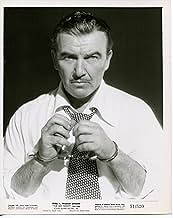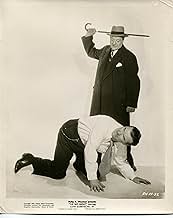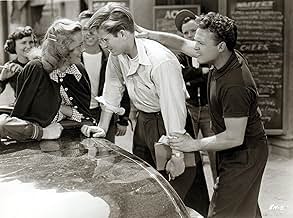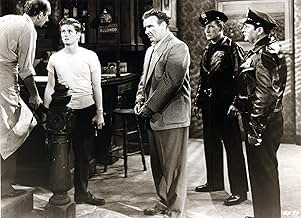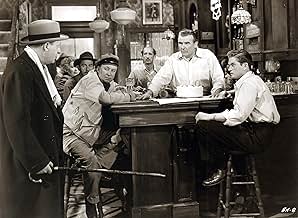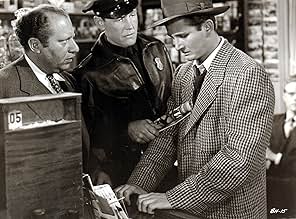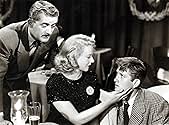PUNTUACIÓN EN IMDb
6,3/10
1,3 mil
TU PUNTUACIÓN
Un adolescente alcanza la mayoría de edad mientras busca vengarse del hombre que golpeó a su padre.Un adolescente alcanza la mayoría de edad mientras busca vengarse del hombre que golpeó a su padre.Un adolescente alcanza la mayoría de edad mientras busca vengarse del hombre que golpeó a su padre.
- Dirección
- Guión
- Reparto principal
John Drew Barrymore
- George La Main
- (as John Barrymore Jr.)
Howland Chamberlain
- Flanagan
- (as Howland Chamberlin)
Emile Meyer
- Peckinpaugh
- (as Emil Meyer)
Mauri Leighton
- Terry Angelus
- (as Mauri Lynn)
Robert Aldrich
- Ringsider at Fight
- (sin acreditar)
Walter Bacon
- Boxing Match Spectator
- (sin acreditar)
Benjie Bancroft
- Bar Patron
- (sin acreditar)
Robert Bice
- Taxi Driver
- (sin acreditar)
Willie Bloom
- Boxing Match Spectator
- (sin acreditar)
Chet Brandenburg
- Boxing Match Spectator
- (sin acreditar)
Lane Chandler
- Printer
- (sin acreditar)
Edmund Cobb
- Cop
- (sin acreditar)
Reseñas destacadas
As previous reviewer wrote, saw this on TCM and the sound was terrible. Good story in need of a cleanup. I like hearing dialogue.
From Losey's American feature films (a period which barely lasted four years, when he fell victim to political persecution) I had only previously watched his eccentric debut, THE BOY WITH GREEN HAIR (1948). The same year he made THE BIG NIGHT, a low-budget noir, he directed two other thrillers - THE PROWLER, Losey's own favorite from this early phase of his career and M, an Americanization of Fritz Lang's German masterpiece. Both these films promise to be a good deal more interesting than the ones I watched, and I hope I get the chance to view them someday...
Anyway, back to THE BIG NIGHT: in itself, it wasn't too bad but it didn't feel at all like a Losey film; perhaps that's because I'm not used to watching him dealing with an American setting - but it's still a minor film, not quite knowing where it's going and not even that compelling while it's on. The noir-ish atmosphere (courtesy of cinematographer Hal Mohr), however, is quite interestingly deployed - sometimes with an audacious psychological resonance, as in the nightclub scene where a riotous drum solo brings back to lead John Barrymore Jr. (looking more like Sean Penn than his matinée' idol father!) memories of his father's vicious beating at the hands of a crippled but influential sports columnist (an effectively sinister Howard St. John); the latter episode is actually a key scene, which sets the plot in motion and sends Barrymore - who witnessed father Preston Foster's humiliation and whom he idolized - seething with revenge in search of St. John.
The characters are largely stereotypes - caring bartender (Foster owns a bar), philosophical drunk pal, his bitter girlfriend (a rather spent Dorothy Comingore, who 10 years earlier had played Susan Alexander in CITIZEN KANE [1941]!), her good-girl sister who falls for and yearns to 'save' Barrymore, shady promoter Emil Meyer (a dry run for his memorable turn as a crooked cop in SWEET SMELL OF SUCCESS [1957]), etc. - but the last act provides a couple of ironic twists involving the characters of Foster, St. John and the tragic fate of a woman they both loved in their own way.
Anyway, back to THE BIG NIGHT: in itself, it wasn't too bad but it didn't feel at all like a Losey film; perhaps that's because I'm not used to watching him dealing with an American setting - but it's still a minor film, not quite knowing where it's going and not even that compelling while it's on. The noir-ish atmosphere (courtesy of cinematographer Hal Mohr), however, is quite interestingly deployed - sometimes with an audacious psychological resonance, as in the nightclub scene where a riotous drum solo brings back to lead John Barrymore Jr. (looking more like Sean Penn than his matinée' idol father!) memories of his father's vicious beating at the hands of a crippled but influential sports columnist (an effectively sinister Howard St. John); the latter episode is actually a key scene, which sets the plot in motion and sends Barrymore - who witnessed father Preston Foster's humiliation and whom he idolized - seething with revenge in search of St. John.
The characters are largely stereotypes - caring bartender (Foster owns a bar), philosophical drunk pal, his bitter girlfriend (a rather spent Dorothy Comingore, who 10 years earlier had played Susan Alexander in CITIZEN KANE [1941]!), her good-girl sister who falls for and yearns to 'save' Barrymore, shady promoter Emil Meyer (a dry run for his memorable turn as a crooked cop in SWEET SMELL OF SUCCESS [1957]), etc. - but the last act provides a couple of ironic twists involving the characters of Foster, St. John and the tragic fate of a woman they both loved in their own way.
Lots of accused Communists involved in this film, and one spy!
Yes - John Barrymore Jr. Was paid and given an expense account to spy on poor Joseph Losey, the director. Barrymore later confessed to Losey, who forgave him, and the two enjoyed fabulous meals on Barrymore's FBI expense account.
George La Main (John Drew Barrymore) is Georgie, who watches his father caned and beaten brutally by a sportswriter, Al Judge. We don't know why, just that he takes it.
Georgie, only 17, is traumatized and wants revenge. This quest takes him to a prize fight, nightclubs, and apartments in walk-ups in the seedier parts of Los Angeles as apropos the noir atmosphere. What Georgie learns will take him out of his youth. It's disillusioning but it's reality, like it or not.
This is Losey's last film before blacklisting causes him to leave the country. The role of Georgie is a James Dean-type role. Georgie is portrayed as kind of a dork though Barrymore was better looking than this. He does a good job as the tortured young man.
Preston Foster, Howard St. John, Joan Lorring, and Dorothy Comingore (in her last role) provide good support.
In the end, the film, though uneven, shows that secrets and lies can hurt, and people can betray and disappoint you; sadly, it's all part of life's tapestry.
Certainly no one knew that better than Losey, the ruined Comingore, uncredited writers Lardner and Butler, and actor Howard Chamberlin, all part of this film and blacklisted.
Yes - John Barrymore Jr. Was paid and given an expense account to spy on poor Joseph Losey, the director. Barrymore later confessed to Losey, who forgave him, and the two enjoyed fabulous meals on Barrymore's FBI expense account.
George La Main (John Drew Barrymore) is Georgie, who watches his father caned and beaten brutally by a sportswriter, Al Judge. We don't know why, just that he takes it.
Georgie, only 17, is traumatized and wants revenge. This quest takes him to a prize fight, nightclubs, and apartments in walk-ups in the seedier parts of Los Angeles as apropos the noir atmosphere. What Georgie learns will take him out of his youth. It's disillusioning but it's reality, like it or not.
This is Losey's last film before blacklisting causes him to leave the country. The role of Georgie is a James Dean-type role. Georgie is portrayed as kind of a dork though Barrymore was better looking than this. He does a good job as the tortured young man.
Preston Foster, Howard St. John, Joan Lorring, and Dorothy Comingore (in her last role) provide good support.
In the end, the film, though uneven, shows that secrets and lies can hurt, and people can betray and disappoint you; sadly, it's all part of life's tapestry.
Certainly no one knew that better than Losey, the ruined Comingore, uncredited writers Lardner and Butler, and actor Howard Chamberlin, all part of this film and blacklisted.
Joseph Losey on his nightmare years on Hollywood accused of anti-American activities that famous black list, here made a small Noir picture starring the younger Barrymore's clan John Barrymore Jr, playing a teenager who testified his beloved father Andy La Main (Preston Foster) get beat up upon eyes of many customers without any defensive posture, it pulls out entrains of soul, seek revenge through the night against a notorious sportswriter Al Judge (Howard St. John) wherever he goes all night long, firstly on a box match where he bumps into a friendly guy Dr. Lloyd Cooper (Philip Bourneuf) who'll buy an extra ticket, stolen by a corrupt cop aftermaths, he is introduces for a Dr. Lloyd's lover Marion (Joan Loring) at night club, meanwhile looking around Al Judge's whereabouts.
The young George La Main stalking Al Judge in every place, this journey actually is his prove of fire, due in that night George will see how the anger sometimes is silly over a so complex matter regarding his father's past happenings, he'll meets a gorgeous black singer girl, where the society barrier split apart, also on Marion's apartment he randomly faces a young girl whom cares about him, depressing and haunted George seeks Al Judge at your own apartment aiming for clear up and finally got his so awaited revenge, however the real reason will baffled him when the perpetrator claiming a fair reason.
Aside the fine premise the outcome is faraway to be suitable, a lame screenplay lost a fair opportunity to allowed a convincing ending, what a waste, in other hand there are plenty of fine sequences at long night in several places, as the fabulous one at toilet, also on the box match when George watching Al Judge thru binocs one second later Al disappears from the sight, fantastic sequences worthwhile a look in this early Losey.
Thanks for reading
Resume:
First watch: 2023 / How many: 1 / Source: DVD / Rating: 7.
The young George La Main stalking Al Judge in every place, this journey actually is his prove of fire, due in that night George will see how the anger sometimes is silly over a so complex matter regarding his father's past happenings, he'll meets a gorgeous black singer girl, where the society barrier split apart, also on Marion's apartment he randomly faces a young girl whom cares about him, depressing and haunted George seeks Al Judge at your own apartment aiming for clear up and finally got his so awaited revenge, however the real reason will baffled him when the perpetrator claiming a fair reason.
Aside the fine premise the outcome is faraway to be suitable, a lame screenplay lost a fair opportunity to allowed a convincing ending, what a waste, in other hand there are plenty of fine sequences at long night in several places, as the fabulous one at toilet, also on the box match when George watching Al Judge thru binocs one second later Al disappears from the sight, fantastic sequences worthwhile a look in this early Losey.
Thanks for reading
Resume:
First watch: 2023 / How many: 1 / Source: DVD / Rating: 7.
John Drew Barrymore Jr. Enters the "Family Tradition" and Dives Deeply and Emerges with an Over-the-Top Hot Performance that Desperately Demands a Non-Nepo Response.
Awkward, Nervously Angst-Ridden, He Performs Like His Life Depended-On-It, Trying Maybe a Beat too Hard.
But Director Losey Let Him, and other Things Here Go Un-Checked.
Relying on the Dark Underbelly of the City its Megalopolis Tendency to Erode and Crush the "Little People", that by Fate, Inhabit the Arteries of the "Concrete Jungle" Clinging to Every Vine and Crevice for Survival.
The Movie seems a Bit-Rushed (anticipating Losey's life in forced-flux), compared to Other more Solid Cinema Unleashed by the Cynical, Left-Leaning "Auteur" that was Victimized by the "Red-Scare" and an Out-of-Control Political Corruption that Failed to See the Unconstitutional Error of Their Ways in Real Time.
The Film, in 1951 was Made when Film-Noir itself was the Victim of a "System" on the Warpath to Sanitize anything in America that Looked Like a Trend Away from the Idealistic, Road-Map Created for a Guide of What Was and What Was Not Acceptable to the Clergy, Law Enforcement and a Fake Moral-Compass Pointing the Way of "Americanism" by Standards Made-Up On-the-Fly to Fit the Form of a Pre-Conceived Conservative Society that Toed-the-Line, Obeyed Orders from the Top and Didn't Ask Questions. After All, "They" were Looking-Out-For-You.
Losey, and Others were Free-Thinking, Empathetic, and were More Interested in the Collective Good and Not the Collective as Sub-Servant.
A True Film-Noir Founder and Pioneer. "The Big Night" is just 1 of His Many Contributions to the Growing, Spontaneous, Sub-Genre that Allowed 1940's Creative Film-Makers and Social Commentators to Vent and Vocalize a Point of View that was Hardly Main-Stream.
Like All of Joseph Losey Films...
Worth a Watch.
Awkward, Nervously Angst-Ridden, He Performs Like His Life Depended-On-It, Trying Maybe a Beat too Hard.
But Director Losey Let Him, and other Things Here Go Un-Checked.
Relying on the Dark Underbelly of the City its Megalopolis Tendency to Erode and Crush the "Little People", that by Fate, Inhabit the Arteries of the "Concrete Jungle" Clinging to Every Vine and Crevice for Survival.
The Movie seems a Bit-Rushed (anticipating Losey's life in forced-flux), compared to Other more Solid Cinema Unleashed by the Cynical, Left-Leaning "Auteur" that was Victimized by the "Red-Scare" and an Out-of-Control Political Corruption that Failed to See the Unconstitutional Error of Their Ways in Real Time.
The Film, in 1951 was Made when Film-Noir itself was the Victim of a "System" on the Warpath to Sanitize anything in America that Looked Like a Trend Away from the Idealistic, Road-Map Created for a Guide of What Was and What Was Not Acceptable to the Clergy, Law Enforcement and a Fake Moral-Compass Pointing the Way of "Americanism" by Standards Made-Up On-the-Fly to Fit the Form of a Pre-Conceived Conservative Society that Toed-the-Line, Obeyed Orders from the Top and Didn't Ask Questions. After All, "They" were Looking-Out-For-You.
Losey, and Others were Free-Thinking, Empathetic, and were More Interested in the Collective Good and Not the Collective as Sub-Servant.
A True Film-Noir Founder and Pioneer. "The Big Night" is just 1 of His Many Contributions to the Growing, Spontaneous, Sub-Genre that Allowed 1940's Creative Film-Makers and Social Commentators to Vent and Vocalize a Point of View that was Hardly Main-Stream.
Like All of Joseph Losey Films...
Worth a Watch.
¿Sabías que...?
- CuriosidadesAccording to interviews that director Joseph Losey gave in the mid-1970s to Michel Ciment, the FBI wanted to spy on him in Europe, where he relocated to work after being blacklisted by Hollywood because of his political activities. So they paid John Drew Barrymore (who became a good friend after this movie) to furnish information about Losey's political activities, if any, in London. Barrymore later met Losey in London and confessed to him about the money and expense account the FBI had given him to spy on Losey. Losey, recalling that the young actor had been under tremendous pressure at the time, forgave him and, in fact, suggested that they have several lavish meals together and put the cost on Barrymore's FBI expense account, which they promptly did.
- PifiasThe magazine racks outside the corner store are mostly issues contemporary to 1951, with one glaring exception. A copy of the famous first issue of The New Yorker (published in 1925).
- Citas
Peckinpaugh: Next time you see somebody drop money, don't think about it so long before you decide to give it back.
- ConexionesFeatured in Vampira: The Big Night 1951 (1956)
Selecciones populares
Inicia sesión para calificar y añadir a tu lista para recibir recomendaciones personalizadas
- How long is The Big Night?Con tecnología de Alexa
Detalles
- Fecha de lanzamiento
- País de origen
- Idioma
- Títulos en diferentes países
- The Big Night
- Localizaciones del rodaje
- 218 East 12th Street, Downtown, Los Ángeles, California, Estados Unidos(George goes to the old St. Joseph's Church - destroyed by fire and demolished in 1983)
- Empresa productora
- Ver más compañías en los créditos en IMDbPro
- Duración
- 1h 15min(75 min)
- Color
- Relación de aspecto
- 1.37 : 1
Contribuir a esta página
Sugerir un cambio o añadir el contenido que falta



